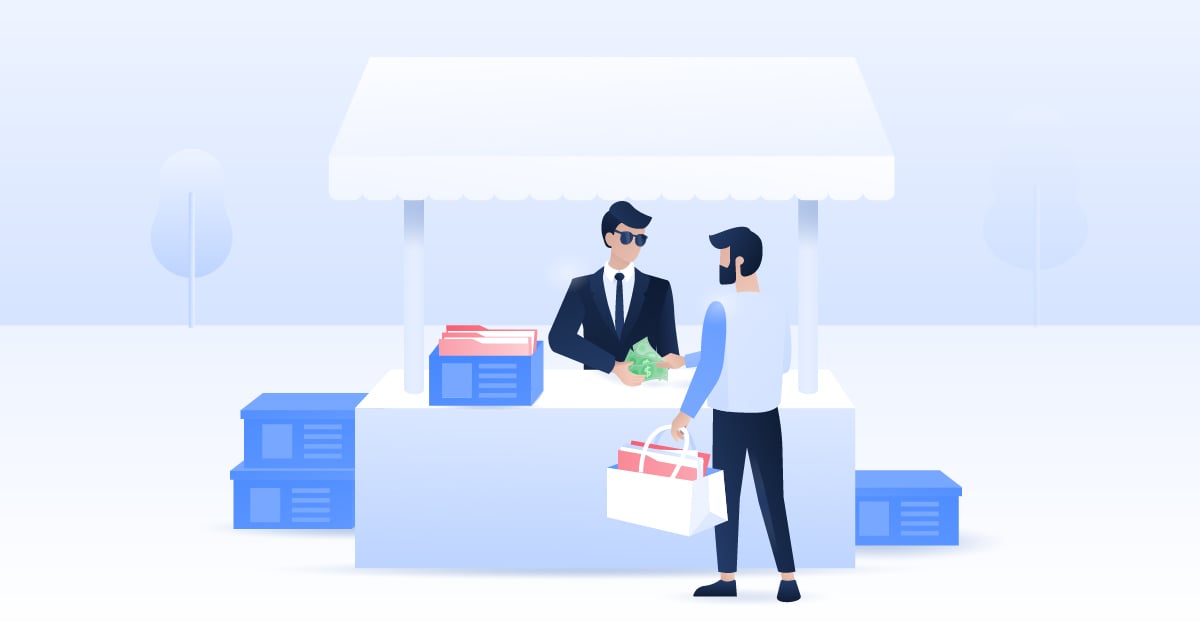What is data hoarding, and what risks does it pose?
Data hoarding takes many forms, from storing digital assets with potential value to accumulating useless data that only induces stress. So, what exactly is data hoarding, and what consequences can it have for a person or organization? Learn about the types of data hoarding, how it can affect your life, and how to stop and prevent this practice before it gets out of control.
Contents
What is data hoarding?
Data hoarding is the practice of collecting and storing large amounts of digital information, often more than is necessary or useful. This behavior can be driven by various factors, including the fear of losing valuable data, the desire to archive information for future use, or simply the habit of not deleting redundant or obsolete files.
Data hoarders accumulate large volumes of digital content, from emails and documents to photos, videos, and software files. This can include keeping multiple copies of the same data. Often, the collected data is poorly organized or not organized at all, making it challenging to locate specific information when needed. On a personal level, like physical hoarding, digital hoarding can have psychological reasons behind it, such as anxiety, a compulsion to collect, or difficulty discarding items perceived as valuable.
Data hoarding reflects a broader trend in the digital age where the ease of data creation and storage leads to an overwhelming abundance of digital content, necessitating more thoughtful approaches to data management and organization.
What are the types of data hoarding?
On the most basic level, data hoarding can be individual or organizational. Individual data hoarding refers to individuals keeping more data than needed, while in organizational hoarding, companies and institutions practice this behavior.
Many studies have been done to understand both types of data hoarding, usually splitting the types of digital hoarding into smaller categories.
What are the types of data hoarders?
Most studies agree on four main dimensions of data hoarding: anxiety, disengagement, compliance, and collection. Based on these dimensions, data hoarders are separated into:
- Anxious hoarders. Anxious hoarders are afraid of the future consequences of deleting data or have unhealthy attachments to their files. They may consider the data useless now but worry that it may become needed in the future. For example, you may have thousands of screenshots on your phone, most of which were taken for a one-time use and no longer serve any purpose. But you may keep them on your phone and make backups, fearing that you’ll need them eventually.
- Disengaged or accidental hoarders. Many hoarders don’t intend to keep digital data forever but hoard it because they can’t find the time or motivation or lack the knowledge to organize their files. It happens to the best of us – when was the last time you deleted old photos from your phone?
- Collectors. Collectors are data hoarders who are intentional about their data-keeping. They have the necessary skills to organize data for fast retrieval and secure storage. For example, you may create folders of your old photos based on a particular year, location, or activity. You keep them for memory’s sake and don’t want to lose them, so you make multiple backups. That’s intentional data hoarding or collecting – there’s nothing wrong with it.
- Compliant hoarders (“hoarders by instruction”). Compliant hoarders are similar to collectors – they have a reason for hoarding data and often organize and store the data properly. But while collecting is often a type of individual data hoarding, compliant hoarding is more common in organizations. Employees can be instructed to hoard data for reasons they may not be aware of, sometimes going beyond what’s needed to comply with data retention laws.
What types of data can be hoarded?
Data hoarding can manifest in various forms, reflecting the diverse nature of digital content and the reasons individuals or organizations accumulate it. Here are some common types of data that may be hoarded:
- Personal data. Individuals often accumulate large amounts of personal data, such as photos, videos, emails, and documents. This may be due to a desire to retain memories, fear of losing important information, or simply failing to organize and delete unnecessary files.
- Software programs, games, and related files, even when not used. A data hoarder can store multiple versions of the same software or games.
- Research data. Researchers and academics may hoard data for future analysis or reference. This data includes publications, datasets, and experimental results.
- Business data. Companies often retain vast amounts of data for business intelligence, customer records, and transaction histories. Sometimes, data is kept longer than necessary due to regulatory requirements or in case it might be useful in the future.
- Backup redundancy. Overzealous backup practices can lead to multiple copies of the same data being stored in different locations, leading to unnecessary data accumulation.
- Information scraping. Organizations may collect large amounts of data from websites or databases, often more than is needed or can be effectively used.
What are the risks of data hoarding?
Storing large amounts of data presents various challenges and risks for organizations. The greater the volume of data stored, the higher the risk of data breaches, making stored data a prime target for cyberattacks. The compromise of sensitive or personal information can have severe legal and financial repercussions. Additionally, compliance with strict data protection laws, such as the GDPR, becomes more challenging with data hoarding, potentially resulting in significant fines and reputational damage.
Moreover, the resources required for managing large volumes of data, including hardware, software, and human resources, escalate operational costs. Managing and analyzing extensive data sets is inherently complex, increasing the likelihood of errors and diminishing the quality of insights obtained from the data. From an environmental perspective, data storage consumes energy, and the more data is stored, the greater the energy usage, thereby contributing to a larger carbon footprint.
Is data hoarding illegal?
Data hoarding is not inherently illegal, but it can be associated with illegal or unethical practices depending on the context and the nature of the digital hoarding.
It can be illegal if the hoarded data is personal or sensitive information obtained without consent. This includes personal identification information, financial data, and health records. Hoarding data is also unlawful if a user obtains it through hacking, phishing, or other illegal means, while hoarding copyrighted material without proper licensing can violate copyright laws.
If you are a data broker and practice data hoarding for commercial reasons to sell it to third parties, you can also get into legal trouble. Selling third-party data without users’ consent is illegal in most parts of the world.
How to stop data hoarding
As you can see above, data hoarding can lead to dire consequences, so it’s crucial to stop or at least minimize digital hoarding tendencies before it’s too late.
Don’t know where to start? The following tips will help:
- Begin with a data audit. Set clear reasons for why you need data and write them down. Then, take time to go through your digital assets and decide what (not) to keep.
- Remove files that you haven’t opened for a couple of years. Unless you have a clear reason for keeping data, infrequent use of it suggests you won’t need it in the future.
- Organize the files you decide to keep. If you preserve some data, ensure you can find it when needed. Categorize it with folders and add file names or descriptions to improve finding and retrieving information.
- Find and remove duplicates. Sometimes you can have multiple copies of the same data on the same device. While creating copies for backups is crucial, it’s not a backup if both copies are in the same storage container. So go ahead and delete the extra copy. Simple sorting files by name or size can help find duplicates, and many tools can automate the process.
- Encrypt data and create backups. After a data audit, only valuable data should be left. And if it’s valuable, it should be kept secure. The best way to do so is to encrypt the data and make backups. The additional steps to secure data can also make you think twice about whether you actually need it.
- Keep your desktop clean. Don’t forget about your desktop. Move files stored there to your brand-new folders and delete the rest. The desktop should not be a place for files to begin with – limit it to the shortcuts to programs you use most often or clear it altogether.
- Don’t forget about emails, cloud storage, or your browser. Your devices are not the only technology that accumulates unnecessary data. Think about all the emails you haven’t deleted or even opened, files in your cloud that you’ve long forgotten about, and bookmarks you haven’t opened in months or years. Audit every digital service where you keep data and, while doing so, decide how you can prevent data hoarding in the future.
If it seems impossible to ditch the data hoarding habit, don’t be ashamed to seek help. It can be a sign of a hoarding disorder that needs to be treated with the help of mental health professionals.
How to prevent data hoarding
Once you’re done dealing with the consequences of data hoarding, it’s time to look forward. Here’s what you can do to prevent data hoarding in the future:
Create new digital habits
Accidental data hoarding happens when we don’t have habits to prevent it. So consider taking better care of your cyber hygiene.
Quit bad internet habits. Make it a regular practice to clean your inbox, review and delete files, create backups, and tidy up your digital environment. It can help you manage your digital data and identify the digital clutter you no longer need.
Unsubscribe from unwanted emails
Over time, we can accumulate a lot of newsletters we don’t bother to read anymore and an overwhelming number of marketing email subscriptions that we didn’t want to begin with. To prevent such a scenario, be more mindful about opting in to newsletters in the future and unsubscribe from emails that don’t “spark joy.”
However, ensure the “unsubscribe” buttons are real and not a part of a phishing attempt. When unsure, block the sender of the email instead.
Automate digital tasks
Maintaining a clutter-free digital environment is easier when data cleanup tasks are done automatically. Tools can help you automate many tasks now – from regular backups to organizing files to finding duplicates. They can make it easier to maintain order without manual effort.
Consider the “one in, one out” rule
Various establishments use the “one in, one out” rule, allowing a new person to enter the place only when someone leaves. This rule can be applied in many areas, including prevention of data hoarding:
Need to store something new? Delete something old.
This approach won’t suit everyone, but it can help you if you have struggled with data hoarding in the past and want to prevent it from happening again in the future. It also works well to prevent you from exceeding your digital storage capacities.
Want to read more like this?
Get the latest news and tips from NordVPN.


